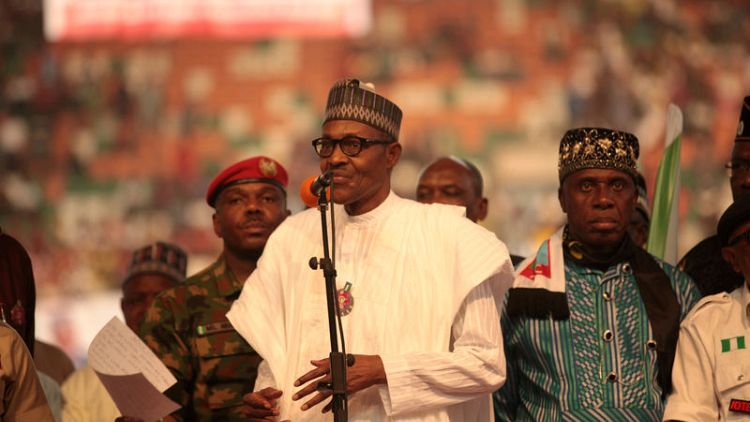By Felix Onuah
ABUJA (Reuters) - Nigeria's president suspended the country's most senior judge on Friday, weeks ahead of an election in which the judiciary could play an important role and prompting the main opposition candidate to describe it as an act of dictatorship.
The suspended chief justice of Nigeria (CJN), Walter Onnoghen, is the head of Nigeria's judiciary which has helped resolve electoral disputes in past votes, some of which have been marred by violence and vote rigging. The chief justice could preside over a disputed election result.
President Muhammadu Buhari, who was a military ruler in the 1980s and was voted into office in 2015, will seek a second term in an election scheduled to take place on Feb. 16. At stake is control of Africa's top crude oil producer which has one of the continent's biggest economies.
Onnoghen has been asked to appear before a tribunal over allegations of breaching of asset-declaration rules, but has not responded to the charges and his lawyers say the tribunal does not have the authority to try him.
"With the directive of the CCT (Code of Conduct Tribunal) in a letter dated 23rd January, 2019, accordingly, I hereby suspend Hon Justice Walter Nkanu Samuel Onnoghen as the Chief Justice of Nigeria until the final determination of the case against him," Buhari said.
In reference to that directive, Buhari - in a message posted on Twitter - said it was an order by the CCT.
Tanko Mohammed, a judge from the northeastern state of Bauchi, is the acting replacement.
On Thursday, an appeal court had issued an interim order to halt charges being brought against the chief justice.
Atiku Abubakar, a businessman and former vice president who is the presidential candidate for the main opposition People's Democratic Party, issued a statement titled: "The purported suspension of CJN Onnoghen is an act of dictatorship taken too far."
"(I) call on Justice Onnoghen and the judiciary to resist with every legal and constitutional means that they can muster," he said.
"This act of desperation is geared towards affecting the outcome of the 2019 Presidential elections," said Atiku.
A media aide to Onnoghen did not immediately respond to phone calls and text messages seeking comment.
Civil society groups have also criticised the suspension.
Clement Nwankwo, executive director of the Abuja-based Policy and Legal Advocacy Centre, said Buhari had "violated the constitution".
"Unless the president has decided to operate a dictatorship, he really must rescind this so-called decision," said Nwankwo, who chairs the Situation Room, a group of more than 70 civic groups monitoring the electoral process. He called on parliament to reconvene and review the decision.
(Additional reporting by Paul Carsten and Camillus Eboh; Writing by Alexis Akwagyiram; Editing by Toby Chopra)
